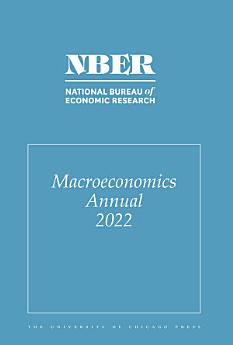NBER Macroeconomics Annual, 2022: Volume 37
Martin Eichenbaum · Erik Hurst · Valerie Ramey
May 2023 · National Bureau of Economic Research Macroeconomics Annual Aklat 37 · University of Chicago Press
E-book
512
Mga Page
family_home
Kwalipikado
info
reportHindi na-verify ang mga rating at review Matuto Pa
Tungkol sa ebook na ito
Authoritative takes on the most current and pressing issues in macroeconomics today.
The NBER Macroeconomics Annual provides a forum for leading economists to participate in important debates in macroeconomics and to report on major developments in macroeconomic analysis and policy.
The NBER Macroeconomics Annual brings together leading scholars to discuss five research papers on central issues in contemporary macroeconomics. First, Andrea Eisfeldt, Antonio Falato, and Mindy Xiaolan document the rise of a new class of worker that receives part of its labor income as equity-based compensation, its role in the recent decline in the labor share of income, and implications for the returns to skilled labor and the implied capital-skill complementarity. Next, Michael Bauer and Eric Swanson focus on monetary policy shocks and argue the correlation between estimated monetary surprises and previously available information can be explained by uncertainty about the parameters of the monetary policy rule. Using new data and methods they find effects of monetary policy on macroeconomic variables that are much larger than previously estimated. Job Boerma and Loukas Karabarbounis provide a framework for quantitatively exploring the gap in wealth between White and Black Americans over the past 150 years and examine the effectiveness of reparations as a tool for closing this gap. Guido Menzio considers workers who do not have rational expectations, and whose “stubborn” beliefs change the response of wages to technology shocks, resulting in sticky wages. He finds that the larger the fraction of workers with stubborn beliefs, the more volatile unemployment is. Finally, Rishabh Aggarwal, Adrien Auclert, Matthew Rognlie, and Ludwig Straub investigate the growth—particularly in the United States—of private savings, current account deficits, and fiscal deficits after 2020. They argue that fiscal deficits lead to large and persistent increases in private savings and current account deficits.
The NBER Macroeconomics Annual provides a forum for leading economists to participate in important debates in macroeconomics and to report on major developments in macroeconomic analysis and policy.
The NBER Macroeconomics Annual brings together leading scholars to discuss five research papers on central issues in contemporary macroeconomics. First, Andrea Eisfeldt, Antonio Falato, and Mindy Xiaolan document the rise of a new class of worker that receives part of its labor income as equity-based compensation, its role in the recent decline in the labor share of income, and implications for the returns to skilled labor and the implied capital-skill complementarity. Next, Michael Bauer and Eric Swanson focus on monetary policy shocks and argue the correlation between estimated monetary surprises and previously available information can be explained by uncertainty about the parameters of the monetary policy rule. Using new data and methods they find effects of monetary policy on macroeconomic variables that are much larger than previously estimated. Job Boerma and Loukas Karabarbounis provide a framework for quantitatively exploring the gap in wealth between White and Black Americans over the past 150 years and examine the effectiveness of reparations as a tool for closing this gap. Guido Menzio considers workers who do not have rational expectations, and whose “stubborn” beliefs change the response of wages to technology shocks, resulting in sticky wages. He finds that the larger the fraction of workers with stubborn beliefs, the more volatile unemployment is. Finally, Rishabh Aggarwal, Adrien Auclert, Matthew Rognlie, and Ludwig Straub investigate the growth—particularly in the United States—of private savings, current account deficits, and fiscal deficits after 2020. They argue that fiscal deficits lead to large and persistent increases in private savings and current account deficits.
Tungkol sa may-akda
Martin Eichenbaum is the Charles Moskos Professor of Economics and codirector of the Center for International Macroeconomics at Northwestern University. Erik Hurst is the Frank P. and Marianne R. Diassi Distinguished Service Professor of Economics at the University of Chicago Booth School of Business and a research associate of the NBER.
I-rate ang e-book na ito
Ipalaam sa amin ang iyong opinyon.
Impormasyon sa pagbabasa
Mga smartphone at tablet
I-install ang Google Play Books app para sa Android at iPad/iPhone. Awtomatiko itong nagsi-sync sa account mo at nagbibigay-daan sa iyong magbasa online o offline nasaan ka man.
Mga laptop at computer
Maaari kang makinig sa mga audiobook na binili sa Google Play gamit ang web browser ng iyong computer.
Mga eReader at iba pang mga device
Para magbasa tungkol sa mga e-ink device gaya ng mga Kobo eReader, kakailanganin mong mag-download ng file at ilipat ito sa iyong device. Sundin ang mga detalyadong tagubilin sa Help Center para mailipat ang mga file sa mga sinusuportahang eReader.







